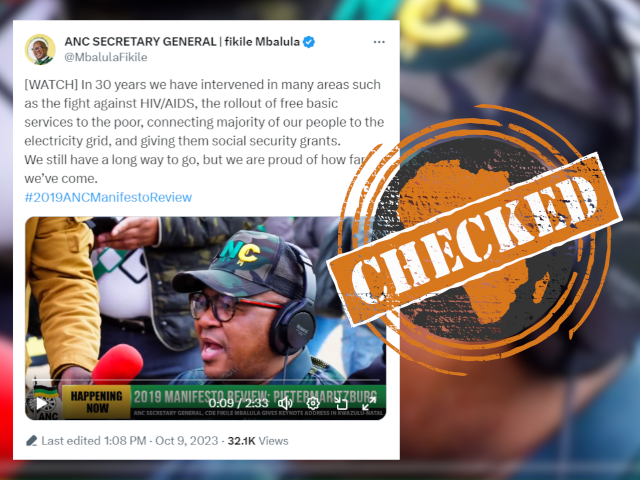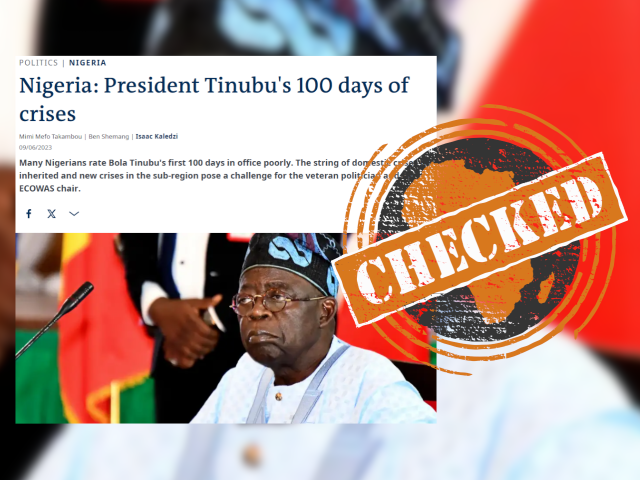President Muhammadu Buhari gave his second Democracy Day speech on 29 May 2018 to commemorate Nigeria's return to civil rule in 1999.
Buhari outlined some of his government’s achievements during the past three years it has been in power, especially regarding the economy.
“The commemoration of this year’s Democracy Day is a celebration of freedom, a salute to the resilience and determination of Nigerians and a recommitment by government to keep its promise to lead Nigeria into a new era of justice and prosperity,” the president said in a national broadcast.
Here are seven key claims we have fact-checked in Buhari’s speech.
In June 2017, Africa Check found a similar claim incorrect. In at least three years since 2008, the allocation to public projects on roads, power, railways and so forth exceeded 30%.
This was in 2008, 2010 and 2013, according to budgetary data. The infrastructure share during this time was the highest in 2008, at 37% of the total budget.
The lowest allocation in that period was 11% of the budget in 2015, which was approved by Buhari’s predecessor, Goodluck Jonathan.
Experts said that the use of these funds should be the main focus, as only a small proportion of the budgeted cash actually reaches the intended agencies.
In January 2017 inflation stood at 18.72%, according to data from the Central Bank of Nigeria. This was the highest it has been during Buhari’s term, which began in May 2015. At the time, inflation was recorded at 9%.
In the 16 months prior to the new government the rate was between 7.7% and 8.7%.
In February 2017, the rate fell to 17.78%. It has kept its downward trend since, reaching 15.13% in January 2018 and 13.34% in March 2018.
Buhari said the peak showed government’s progress in increasing the quantity and quality of power available to Nigerians. The country’s long-standing electricity deficit is persistently blamed for hurting economic growth.
According to a daily power brief run from the vice president’s office, the peak of 5,222.3 MW generated was reached on 18 December 2017. However, the average amount of power sent out on the day to customers was 4,266 MW.
Kingsley Osuoha is general manager of the control centre at the national transmission company. He told Africa Check that the president’s figure represented the peak of power generation that occurred that day, but this is not what would have reached consumers due to transmission losses.
(Note: For more information on Nigeria’s power, read our detailed factsheet.)
The Lagos centre is one of his government's strides in aviation and would save the country an estimated US$90 million yearly, Buhari added.
A centre to service aircraft – known in the industry as a “maintenance, repair and overhaul” facility - can help attract passengers and cargo, Africa Check found in a September 2017 report. Other gains include the creation of jobs and saving on money that would otherwise be spent in another country to service aircraft.
Aviation experts said that maintenance, repair and overhauls “can be very limited, basic tasks performed at an airport (line maintenance) or complex maintenance checks including structural work (base or heavy maintenance)”. A C-check falls under heavy maintenance.
The Lagos centre is owned by indigenous airline Aero Contractors which was taken over by the Asset Management Company of Nigeria in 2016. It was launched in Lagos in February 2018 after C-checks were successfully done on a Boeing 737 aircraft owned by Aero.
Captain Ado Bayero, who now heads Aero Contractor, confirmed to Africa Check that the facility is fully operational and as at 30 May 2018 had three aircraft in its hangar undergoing different checks.
He said the facility has certification up to C-checks and will help other airlines save money and time.
Under its Universal Basic Education programme, Nigeria seeks to provide nine years of free and compulsory formal education. To support this, the government gives states a grant to fund classrooms, laboratories, libraries, and buy other learning aids such as books.
The most recent publicly available data from the Universal Basic Education Commission shows that N33.9 billion was disbursed to states in 2015/2016.
Commission data shows that as at August 2017 none of the country’s states had accessed N732 million allocated to each. In total, N71 billion was unused by states. (Note: Africa Check has contacted the basic education commission for the president’s data and will update this report with their response.)
Further, to access this grant, the law requires states to put up a similar amount in addition to showing how they spend the money. Many do not meet this requirement, leading to the head of the commission, Hamid Bobboyi, to reportedly highlight his concerns about the low uptake.
An education lobby told Africa Check that they could not find data to support Buhari’s claim. “Unfortunately, there is no recent verifiable evidence that this amount has been paid out to that number of states,” Oriyomi Ogunwale, the project lead of Eduplana Nigeria, said. Ogunwale added that disbursements in 2015 and 2016 had been a concern.
The organisation’s advocacy work includes education funding, policy and learning outcomes.
The presidency also made this claim in its 2017 Democracy Day speech.
Data shared with Africa Check by the national statistics office shows that the official value of rice imports fell 99% between 2015, when Buhari took office, and 2017.
TABLE: Value of Nigeria rice imports (2014-2017)
| YEAR | Value ( Naira) | Per year % reduction |
| 2014 | 107.65 bn | * |
| 2015 | 95.88 bn | 10.9 |
| 2016 | 17.91 bn | 81.3 |
| 2017 | 0.95 bn | 94.5 |
*2013 data not available. SOURCE: NATIONAL BUREAU OF STATISTICS
In this period the government introduced policies to cut imports such as tariff increases and foreign currency restrictions. It also started a plan to lend to local farmer at lower interest rates.
As a result, while local production is increasing, it is still not enough to meet demand in Africa’s largest consumer of rice. Nigeria grew 3.7 million metric tonnes of rice in 2017, a 4% increase over 2016, according to the US department of agriculture.
This supply and demand gap is being met by smugglers who are doing brisk business, a number of media reports say.
Nigeria’s school feeding programme aims to improve attendance and improve child nutrition and cognition, among other goals.
Some 18 states were to be piloted in 2016, according to the programme’s 2016-2020 strategic plan, with all 36 states to be covered by 2018. Official statements of how many children are benefiting have grown from a million pupils in seven states in February 2017 to 7 million in 22 states in February 2018.
In May 2018 the vice president put the figure at 7.6 million in 22 states, before President Buhari’s latest figure of 8.2 million children in 24 states.
The national statistics office did not have data on the programme as it was not mandated to survey it, Dr Isiaka Olarewaju, a director at the National Bureau of Statistics, told Africa Check.
There is no way to independently verify the government’s figures, Dr Moses Amosun, who teaches at the department of early childhood and educational foundations at the University of Ibadan told Africa Check.
Amosun said that “what should matter is how the programme has affected basic education outcomes across the country.”




Add new comment